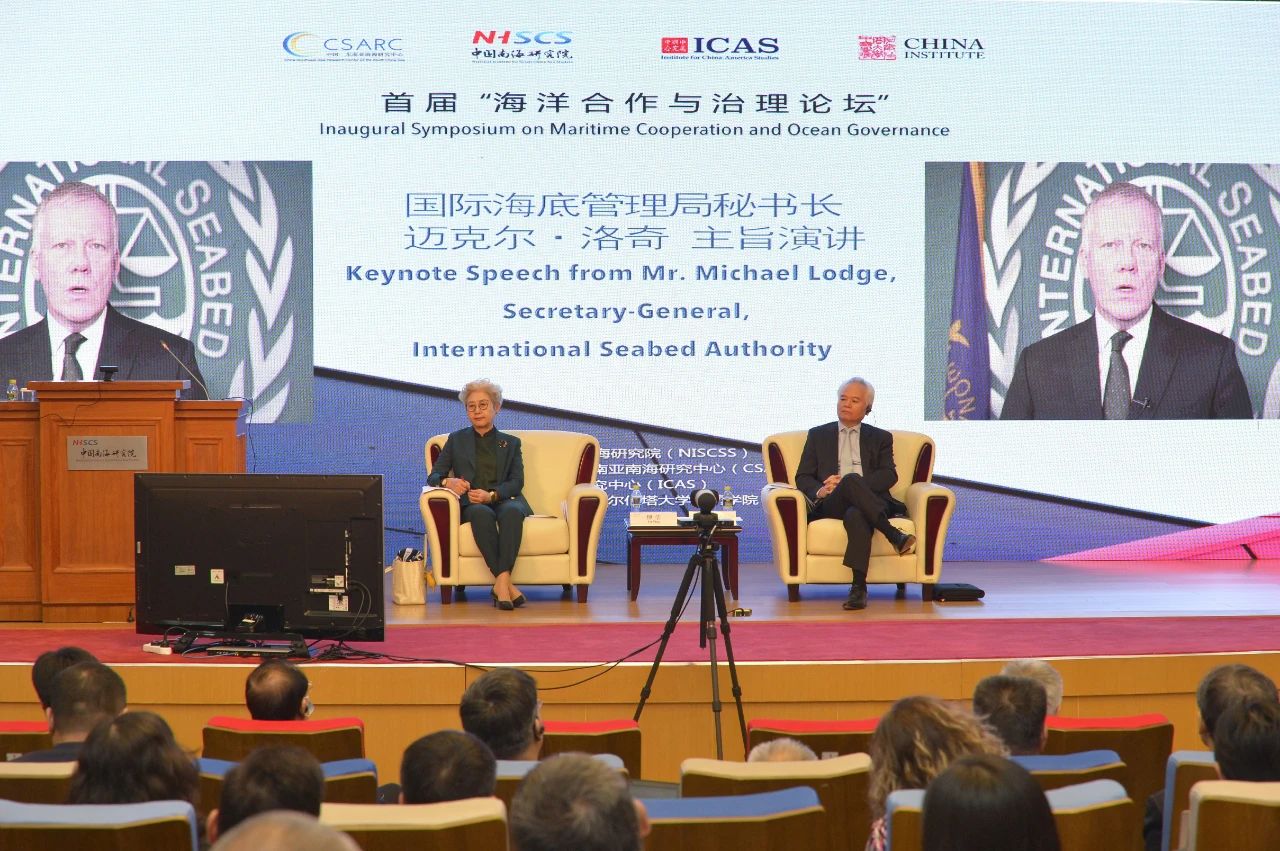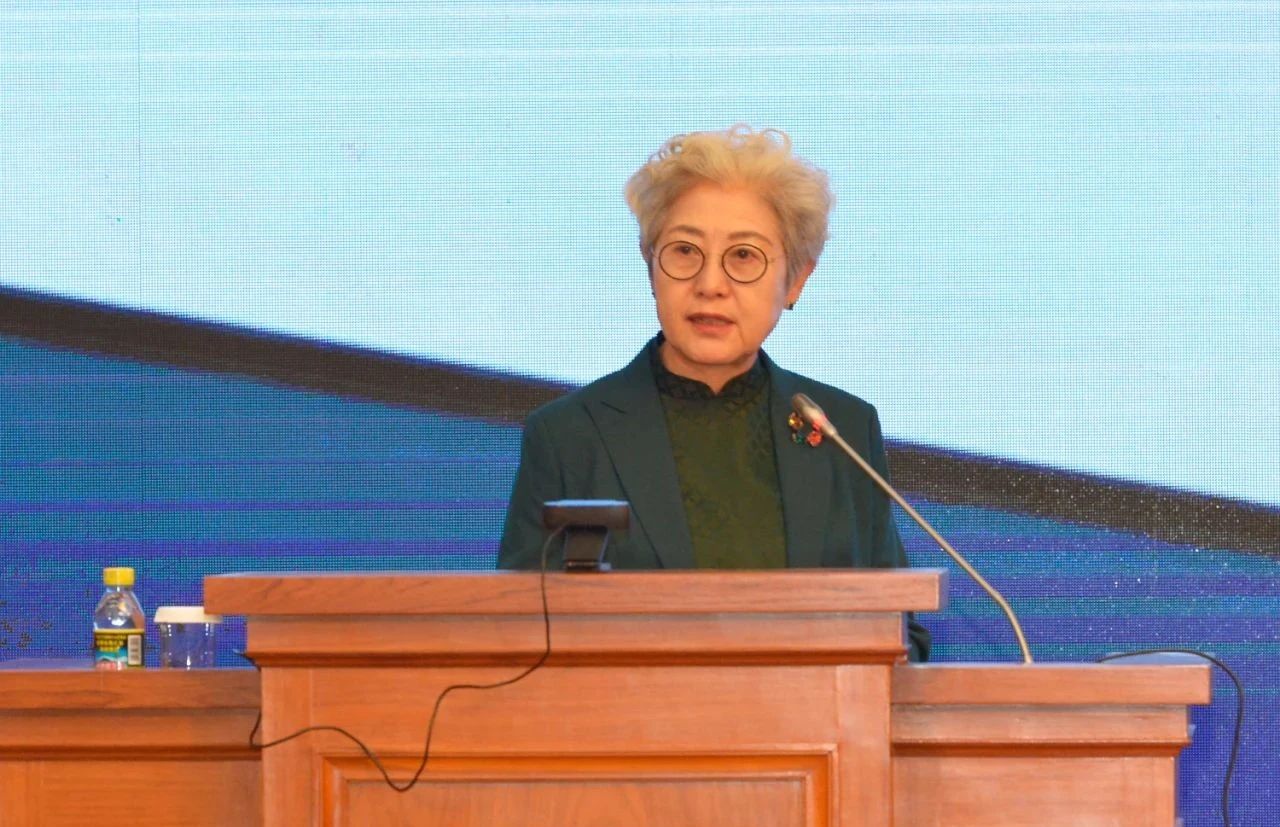编者按:
2020年11月5日,应中国南海研究院邀请,清华大学战略与安全研究中心主任傅莹出席在海口举办的首届“海洋合作与治理论坛”,并在开幕式上发表题为“坚持以多边主义思维推进海洋合作与治理”的讲话。傅莹强调,海洋的公共性和流动性决定了没有一个国家可以独立、独自地解决面临的挑战和问题,唯有依靠合作才有出路。以下是讲话全文。英文版由《中国日报》翻译并于11月23日发表。
中国南海研究院倡议举办这个论坛,目的是建立一个关注全球海洋问题、探讨海洋治理、推动国际海洋合作的平台,同时,也可以就海洋治理和合作问题向国际社会提供南海地区国家的观点和主张,这个论坛的举办可以说是恰逢其时。
中国在南海问题上的政策是清晰的,与南海沿岸国家的合作也取得明显进展。中国与东南亚沿海国家都重视海洋合作。2002年签署的《南海各方行为宣言》(DOC)为地区合作提供了指导框架,各国双边和多边的合作包括海上安全、经济和科研多个领域,东盟地区论坛(ARF)、东盟防长会议(ASEAN Defence Ministers Meeting)、中国-东盟交通部长会议(ASEAN and China Transport Ministers Meeting)、中国-东盟海上合作基金(China-ASEAN Maritime Cooperation Fund)等机制,构成有效的平台。

另外,海上合作制度与规则建设也初见成效,例如,各方就《海上意外相遇规则》(The Code for Unplanned Encounters at Sea, CUES)在南海适用达成一致,《南海行为准则》(COC)的磋商也在不断积累共识,稳步推进。
海上合作也有力地促进了彼此的信任和利益的融合,今年1-9月,中国对东盟直接投资同比增长了76.6%,达107.2亿美元;同期中国与东盟贸易额同比增长5%,达4818.1亿美元,东盟目前是中国最大的贸易伙伴。
这些年来,中国积极推进与周边国家在海洋环境保护、海洋生态系统与生物多样性、海洋政策与管理等多个方面开展合作,促进“蓝色经济”的发展。
值得关注的是,近年出现“逆全球化”的思潮,单边主义抬头,这难免会削弱全球海洋合作的动力。我相信,本地区的大部分国家都愿意继续推动海洋治理,赞成治理体系的创新和完善。我想提出以下想法与大家分享:
第一,海洋合作与治理的最终目标应该是人与海洋的和谐共存。
习近平主席在关于海洋命运共同体(maritime community with a shared future)的论述中强调,“建设一个和平、合作、和谐的海洋,构建一个和平安宁、合作共赢的海洋秩序,使海洋这个世界最大的公地成为全人类和平、发展、合作、共赢的共同财富”。
在本地区,大湄公河流域次区域(Great Mekong Subregion,GMS)生物多样性保护廊道已经实施十五年,一系列重点项目成效显著。
新的全球生物多样性框架(Global Biodiversity Framework)也在推动当中。然而,过度捕捞、肆意开采、海洋污染等问题也在影响和破坏着被誉为全球生物多样性中心之一的南海,其速度和严重性令人震惊,亟待各方采取有效行动予以制止。
第二,海洋合作与治理的根本目的是服务于人类的共同福祉。海洋是潜力巨大的资源宝库,也是支撑未来发展的战略空间,如何进一步探索和开发海洋已成为各国日益重视的重要领域。
在传统的合作范围之外,应加快区域内海洋生物医药、深海探测等前沿技术创新,让信息化和智能化的海洋技术成果惠及更多人。各国科学家应共同合作,帮助人类更深入地认识海洋、了解海洋,合理利用海洋、有效保护海洋。
第三,海洋合作与治理离不开地区和平与稳定的保障。2012年以来南海局势不断升级,海上的军事紧张气氛引发广泛担忧。一些对南海岛礁和海域有声索要求的国家也缺乏克制,表现出采取更加频繁单边行动的冲动。

2020年9月,王毅外长在第十届东盟峰会外长会议上再次重申了南海问题的三个基本事实:一是、中方对南海诸岛的主权和主权权利有着充分历史和法理依据;二是、中方坚持睦邻友好的周边政策,始终致力于在南海问题上发挥建设性作用;三是、中方始终致力于遵守包括《联合国海洋法公约》在内的国际法。中国在南海的利益诉求多年来一以贯之,那就是维护国家领土主权完整和地区和平安宁。南海地区各方应凝聚共识,共同营造长治久安的发展环境。
四年前,中方提出“双轨思路”,认为这是解决南海问题最为现实、可行的办法。所谓“双轨思路”,是指南沙有关争议由直接当事国通过协商谈判妥善解决,南海地区和平稳定由中国和东盟国家携手共同维护。
令人欣慰的是,虽然各方对一些细节还存在争议,但“南海行为准则(COC)”的磋商正不断积累共识,取得进展。在这样的背景之下,中美两国也应多对话,努力消除分歧、管控风险,实现战略上的和平共存。
在海洋合作与治理上,各国需要秉持更加宽阔的、超越你输我赢零和博弈的海洋视野,更多思考共赢和协同发展。新冠疫情的暴发提醒我们,全球治理亟待完善,国际协调机制的效率亟待提升,在海洋治理领域也是这样的,我们不能总是等待一场危机来刺激治理能力的提升。
海洋的公共性和流动性决定了,没有一个国家可以独立、独自地解决全球性或区域性海洋问题,唯有依靠合作才有出路。多边主义是国际社会探寻应对新问题、新挑战的必由之路。解决海洋问题有赖于各国本着共同安全、合作发展的理念去实践。
海有岸崖,而各洋相通。希望“海洋合作与治理论坛”能够集中各方智慧,推动全球海洋合作与治理不断取得新的进展。
Safeguard our common treasure
Countries should work together to protect the oceans in the spirit of building a maritime community with a shared future
By Fu Ying
China has clear policies on issues relating to the South China Sea and has made remarkable progress in cooperating with countries in the region. China and the members of Association of Southeast Asian Nations attach great importance to marine collaboration.
The Declaration on the Conduct of Parties in the South China Sea(DOC), signed in 2002, serves as a guiding document for regional cooperation. Bilateral and multilateral cooperation in the region covers maritime security, economy and scientific research. Cooperation mechanisms such as ASEAN Regional Forum (ARF), ASEAN Defense Ministers Meeting (ADMM), ASEAN and China Transport Ministers Meeting and China-ASEAN Maritime Cooperation Fund have been set up.
Countries in the region also agree on the application of the Code for Unplanned Encounters at Sea in the South China Sea (CUES), and consultations on the Code of Conduct in South China Sea (COC) have made steady progress.
Maritime cooperation has greatly boosted mutual trust and formed shared interests in the region. From January to September 2020, China’s direct investment in ASEAN countries grew by 76.6% year on year to $10.72 billion. During the same period, the total trade volume between China and ASEAN economies increased by 5% year on year to $481.81 billion, making the regional bloc China’s largest trading partner.
China has been actively promoting cooperation with other countries on maritime policy and management to protect the marine environment, marine ecosystem and biodiversity, thus facilitating the development of the “blue economy”.
However, in recent years, there has been a trend of "anti-globalization" and a rise in unilateralism, which inevitably weakens the momentum of global maritime cooperation. I trust that most countries in the region are willing to continue to promote maritime governance and are in favor of innovation and improvement of the governance system.
President Xi Jinping called for the building of a maritime community with a shared future in a recent speech, stressing the importance of “building a peaceful, cooperative and harmonious ocean, and building a maritime order featuring peace and tranquility, and win-win cooperation”, thus making the oceans “the shared treasure of all humankind”.
The Greater Mekong Biodiversity Conservation Corridor Initiative, which has been implemented for 15 years, has achieved marked progress toward this goal.
A renewed Global Biodiversity Framework is also in the pipeline. The South China Sea is one of the regions with the richest biodiversity in the world, which, however, is greatly threatened by overfishing, excessive exploitation and pollution, among other things, at an alarmingly rapid rate. This calls for parties to take immediate actions.
The ultimate goal of maritime cooperation and governance is to serve the common interests of mankind. Oceans are a treasure trove of resources, and strategic spaces that support mankind’s future development. The exploration and development of oceans has become an increasingly important issue for countries. In addition to traditional areas of cooperation, we should accelerate innovation in frontier technologies such as marine biomedicine and deep-sea exploration, and allow smart marine technologies to benefit more people. Scientists from around the world should work together to help mankind have a deeper understanding of the oceans so as to sustainably exploit them and protect the maritime environment.
Also, regional peace and stability are the preconditions for maritime cooperation and governance. Escalating tensions in the South China Sea since 2012 have sparked widespread concern. Some countries that have claims to islands and seas in the South China Sea have displayed lack of restraint and the impulse to take more frequent unilateral actions.
At the ASEAN-China Foreign Ministers’ Meeting via video link in September, Chinese State Councilor and Foreign Minister Wang Yi reiterated three points about the South China Sea issue: First, the sovereignty of China over islands in the South China Sea and related rights and jurisdiction are well-grounded from both historical and legal perspectives; second, China pursues a friendly policy toward its neighbors in the region, and is committed to playing a constructive role in the area; and third, China has been adhering to international laws including the United Nations Convention on the Law of the Sea (UNCLOS). China’s claims and interests in the South China Sea have been consistent with safeguarding its territorial integrity and national sovereignty as well as regional peace and tranquility. Parties in the region should build consensus on the issue to create an environment for long-term development and prosperity.
Four years ago, China proposed a dual-track approach to resolve the South China Sea issue. According to this approach, disputes over the Nansha Islands should be directly resolved by the disputing parties in the region through negotiations, and regional stability and peace should be maintained by China and the ASEAN countries together.
The good news is that consultations on the Code of Conduct in the South China Sea have made steady progress and consensuses have been building up despite some divergences remaining over details.
Countries should adopt a broader vision and transcend the zero-sum game mindset in maritime cooperation and governance, eyeing win-win cooperation and collaborative development. The novel coronavirus outbreak is a reminder that global governance is in dire need of improvement, and the efficiency of the global coordination mechanism should be improved. It is the same with maritime governance. We cannot wait for a crisis to break out before acting. Against such background, China and the United States should conduct more dialogues to resolve their differences, manage risks and achieve peaceful coexistence.
No country can solve global and regional maritime problems on its own. Cooperation is the only way out. Multilateralism is an inevitable path for the global community to seek solutions to new problems and challenges and the concept of common security and joint development is a guidance to solving maritime issues.
The author is the chairperson of the Center for International Security and Strategy, Tsinghua University (CISS). The author contributed this article to China Watch, a think tank powered by China Daily. The views do not necessarily reflect those of China Daily.

